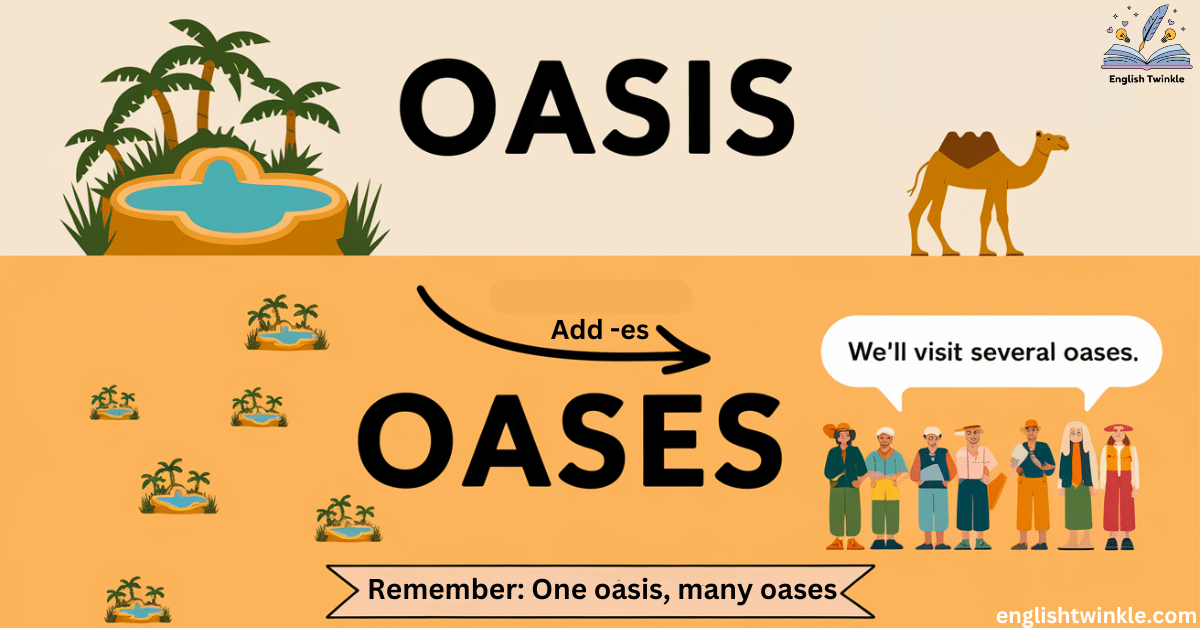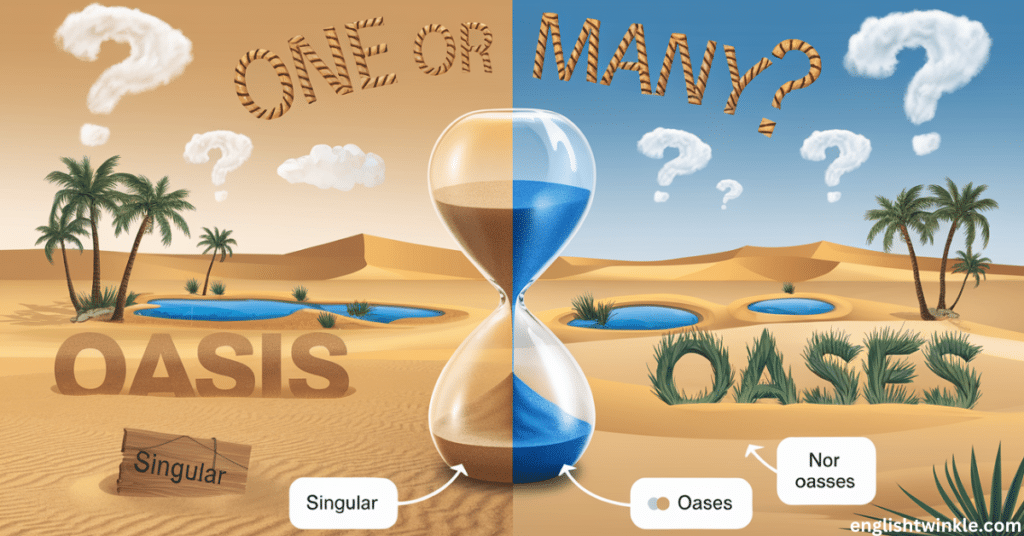In the vast desert of English grammar, few words stand out as uniquely as “oasis.” This linguistic oasis, with its refreshing complexity, often leaves writers and speakers puzzled when it comes to its plural form. Let’s dive into the cool waters of etymology and grammar to quench our thirst for knowledge about this fascinating word.
The Basics of “Oasis”
Before we tackle the plural form, let’s explore the singularity of “oasis.” An oasis is a fertile spot in a desert where water is found. It’s a haven of life amidst barren surroundings. But the word “oasis” isn’t just limited to geographical features; it has expanded its meaning to encompass any place of refuge, relief, or pleasant contrast.
Oasis Definition and Etymology
The word “oasis” comes from Greek “ὄασις” (óasis), which was borrowed from Ancient Egyptian “wḥ3t” or Coptic “ouaḥe” meaning “dwelling place.” Its journey through languages mirrors the nomadic travels across deserts, picking up nuances along the way.
The evolution of the word “oasis” is a testament to the interconnectedness of ancient civilizations. As trade routes crisscrossed the deserts, so did language, with “oasis” becoming a linguistic oasis itself – a word that found a home in multiple languages.
Oasis Pronunciation
Pronouncing “oasis” correctly is key to using it confidently. Here’s a quick guide:
- UK English: /əʊˈeɪsɪs/
- US English: /oʊˈeɪsɪs/
Think of it as “oh-AY-sis” – the stress is on the second syllable. This pronunciation holds true regardless of whether you’re using the singular or plural form, which we’ll explore next.
Singular vs. Plural: A Linguistic Journey
Now, let’s address the burning question: what is the plural of oasis? The answer might surprise you and offers an intriguing glimpse into the quirks of English grammar.
The Singular Form: Oasis
In its singular form, “oasis” refers to a single place of respite or refuge. For example:
- “The weary traveler finally reached the oasis after days in the desert.”
- “Her garden was an oasis of tranquility in the bustling city.”
The singular form “oasis” is versatile, applicable to both literal desert havens and metaphorical places of peace or relief.
The Plural Form: Oases
Here’s where it gets interesting. The plural of oasis is “oases” (pronounced oh-AY-seez). This irregular plural form often catches people off guard. It’s a prime example of how English, as a language that borrows from many sources, sometimes retains the grammatical rules of the original language.
Examples:
- “The caravan planned to stop at several oases along their route across the Sahara.”
- “The city’s parks serve as urban oases, providing green spaces for relaxation.”
Why Not “Oasises”?
You might wonder why we don’t simply add “-es” to form “oasises.” The answer lies in the word’s Greek origins. Many Greek-derived words ending in “-is” form their plurals by changing “-is” to “-es.” This pluralization rule applies to several words in English, creating a subset of nouns that follow this pattern.
Grammar Deep Dive: Irregular Plurals in English
To better understand the plural of oasis, let’s look at some similar words:
| Singular | Plural | Example Sentence |
|---|---|---|
| Thesis | Theses | She’s reviewing several theses for her research. |
| Crisis | Crises | The company faced multiple crises during the pandemic. |
| Analysis | Analyses | The scientists conducted various analyses of the data. |
| Basis | Bases | We need to cover all bases before making a decision. |
| Oasis | Oases | Travelers rely on oases for water in the desert. |
This pattern helps us remember the correct plural form of “oasis” and other similar words. It’s a remnant of Greek influence on English, showcasing the language’s rich linguistic heritage.
“Oasis” and “Oases” in Context

Understanding how to use “oasis” and “oases” in sentences is crucial for clear communication. Let’s explore some examples to illustrate their usage in various contexts:
Oasis (singular):
- “The small town was an oasis of calm in the bustling metropolitan area.”
- “For many, their home became an oasis during the pandemic lockdowns.”
- “The old library stood as an oasis of knowledge in the information desert.”
Oases (plural):
- “Desert ecosystems rely heavily on the scattered oases for biodiversity.”
- “The company created several cultural oases within their large office complex.”
- “Modern cities need to design more green oases to combat urban heat islands.”
Beyond the Desert: Expanded Meanings
While the word “oasis” originated from desert landscapes, its usage has expanded metaphorically. Today, we use it to describe a variety of concepts:
- Ecological oases: Biodiversity hotspots in otherwise uniform environments. These could be small pockets of rainforest in a largely deforested area or coral reefs teeming with life in vast oceans.
- Urban oases: Green spaces or quiet areas in busy cities. Parks, community gardens, and even rooftop green spaces can serve as urban oases, providing respite from the concrete jungle.
- Psychological oases: Mental retreats or moments of peace in stressful situations. This could be a brief meditation break during a hectic workday or a quiet corner in a noisy household.
- Digital oases: In the vast expanse of the internet, certain websites or online communities can serve as oases of reliable information or positive interaction.
- Cultural oases: In areas where certain cultural practices or art forms are rare, spaces dedicated to preserving these can be seen as cultural oases.
Pop Culture and “Oasis”
The word “oasis” has made its mark in popular culture, extending far beyond its literal meaning:
- Oasis (band): The famous British rock band, known for hits like “Wonderwall” and “Don’t Look Back in Anger,” chose this evocative name, perhaps to represent their music as a refreshing change in the rock landscape.
- Movies and TV: The concept of an oasis is often used in storytelling to represent hope or salvation. In post-apocalyptic narratives, finding an oasis can be a pivotal plot point.
- Branding: Many businesses use “oasis” in their names to evoke feelings of relaxation and refuge. This is particularly common in the hospitality and wellness industries.
- Gaming: In video games, especially those set in desert environments, oases often serve as safe zones or resource points for players.
Synonyms and Related Terms
To enrich your vocabulary, here are some synonyms for “oasis” and “oases”:
| Word | Synonyms (Singular) | Synonyms (Plural) |
|---|---|---|
| Oasis/Oases | Haven, Refuge, Sanctuary, Paradise, Retreat, Safe harbor, Port in a storm | Havens, Refuges, Sanctuaries, Paradises, Retreats, Safe harbors, Ports in a storm |
Using these synonyms can add variety to your writing and help convey nuanced meanings in different contexts.
Practical Applications
Knowing how to use “oasis” and “oases” correctly can enhance your writing and speaking. Here are some tips for various contexts:
- Academic writing: Use “oases” when discussing multiple desert water sources or metaphorical places of refuge. For example, “The study examined the role of oases in ancient trade routes.”
- Creative writing: Employ “oasis” to create vivid imagery of solace or contrast. “In the harsh landscape of her life, his love was an unexpected oasis.”
- Everyday usage: Remember the irregular plural when discussing multiple instances of relief or respite. “The city’s new urban planning initiative aims to create small oases of green space throughout the downtown area.”
- Business context: Use the metaphor of an oasis to describe unique selling points or competitive advantages. “Our product serves as an oasis of simplicity in a market cluttered with overly complex solutions.”
- Environmental discussions: When talking about conservation efforts, “oases” can describe critical habitats. “Preserving these forest oases is crucial for maintaining biodiversity in the region.”
Fun Facts and Trivia
Did you know?
- The world’s largest oasis is the Al-Ahsa Oasis in Saudi Arabia, covering an area of over 85.4 square kilometers. It’s a UNESCO World Heritage site and home to more than 2.5 million date palms.
- Ancient oases played crucial roles in the development of trade routes like the Silk Road. They were not just water sources but became important cultural and economic hubs.
- Scientists have speculated about the possibility of oases on Mars, where subsurface water might support life. These potential Martian oases could be crucial for future exploration and possible colonization efforts.
- The Siwa Oases in Egypt was so isolated that its inhabitants developed their own distinct culture and language. It’s famous for its ancient oracle temple where Alexander the Great is said to have visited.
- In ecology, “oases effect” refers to the phenomenon where irrigated areas in arid regions create unique microclimates, often attracting diverse wildlife not typically found in the surrounding desert.
Conclusion
The journey from “oasis” to “oases” takes us through a fascinating landscape of language evolution, cultural exchange, and grammatical quirks. By understanding the plural of oasis, we gain insight into the broader patterns of English pluralization and the rich tapestry of borrowed words that make our language so diverse.
Remember, language is alive and ever-changing, much like the shifting sands around an oasis. Embracing these linguistic nuances enriches our communication and deepens our appreciation for the complexity of English. Whether you’re writing about literal desert oases or metaphorical refuges in life’s challenges, understanding the correct usage of “oasis” and “oases” adds precision and elegance to your expression.
Additional Resources
For those thirsty for more knowledge:
- “The Story of English in 100 Words” by David Crystal – This book offers fascinating insights into words that have shaped the English language, including many with interesting plural forms.
- “The Cambridge Encyclopedia of the English Language” – A comprehensive resource for understanding the intricacies of English grammar and vocabulary.
- Online resources like Merriam-Webster‘s Word of the Day – Subscribe to expand your vocabulary daily, including unusual plurals and word origins.
By exploring these resources, you’ll continue to expand your understanding of English grammar and vocabulary, creating your own linguistic oases in the vast desert of language learning.
Quiz: Test Your “Oasis” Knowledge
Let’s see how much you’ve learned about oases and its plural form. Take this quick quiz to test your knowledge!
- What is the plural form of “oasis”? a) Oasises b) Oases c) Oasi d) Oasae
- Which of these words follows the same pluralization rule as “oases”? a) Cactus b) Focus c) Crisis d) Bonus
- In which language did the word “oases” originate? a) Latin b) Greek c) Arabic d) Ancient Egyptian
- How is “oases” pronounced? a) oh-AY-siz b) oh-AY-seez c) oh-AY-sis-es d) oh-AY-sees
- Which of these is NOT a common metaphorical use of “oases”? a) A calm spot in a busy city b) A moment of peace in a stressful day c) A fertile area in a desert d) A difficult challenge in an otherwise easy task
Answers:
- b) Oases
- c) Crisis
- b) Greek (though it has earlier roots in Ancient Egyptian)
- b) oh-AY-seez
- d) A difficult challenge in an otherwise easy task
How did you do? If you got all five correct, you’re a true oasis expert! Remember, understanding these linguistic nuances not only improves your grammar but also enriches your ability to communicate effectively and creatively.

Freck John, linguist and English educator, shares grammar insights and writing tips at English Twinkle, making language concepts accessible to all learners.







